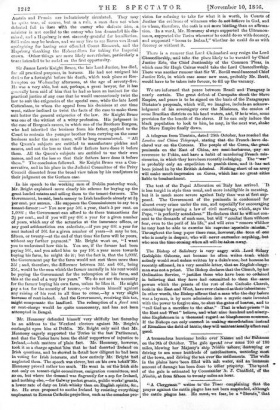In his speech to-the rworkhig men of Dublin-yesterday-week, Mr. Bright
explained more clearly his scheme for buying up the great landed esteem and selling them 'to the tenant-farmers. The Government, he said, lends money to Irish landlords already at 3-1 per cent, per annum. .1Ie supposes the Commissioners to say to a tenant-farmer i-e" You now pay 50/. a year, .that's 5 -per cent. on 1,0001.; the Government can afford to do these transactions for 331- per cent., and if you will pay -601. a year for a given number Of years, which any of the itetueries at the insurance -offices, or any good arithmetician can calculate,—if 'you pay 60/. a year for rent instead of 60/. for a given number of years—it may be ten, fifteen, or twenty—at the end of that time thefarnrwill be yours, 'Without any further payment." Mr. Bright went on, "'I want you to underetand how this is. You see, if the farmer had 'been plying 601., and you adced him to pay 10/. a year more -towards buying his farm, he nitght de it.; bat the fact is, that -the 1,000/. the Government pep for-the farm-wenld.not cost 'them more than 551. ; and, therefore, the difference between 35/. and 601., -being 25/., would be the sum which' thefarrner annually in hisretitvoidd be paying the Government for the redemption of his -farm,- and this at the end of a very 'few years." We do not see-the necessity for the farmer buying his own farm, unless he likes it. He might pay a tax for the security of tenure,—to redeem himself against any raising of his rent in All-time *to come,--eby a -very slight increase of rent indeed. -And the Government, receiving this tax, sleight oompensate the landlord. The redemption of a fixed rent or rent-oharge would be Anita 'unnecessary, and has not been attempted in Bengal.






























 Previous page
Previous page